Wayne C. Allen's Blog, page 26
August 11, 2017
Always Tell the Truth, as You Know It
This is post 7 of 7 in the series “Universal Rules”
Tell the Truth, as You Know It– Honesty really is the best policy — learn why honesty is best
Alter Your Language so Others Have the Best Chance to Hear Your Truth.

Psst! Hey!
Want more great writing designed to help YOU to shift your behaviour? Check out Wayne’s books!
I’m pleased to announce that the following 5 Kindle e-books are FREE from August 11 to 13
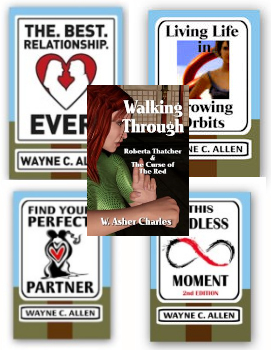
This Endless Moment 2nd. edition
Living Life in Growing Orbits
Find Your Perfect Partner
The. Best. Relationship. Ever.
Walking Through
Enjoy!!!
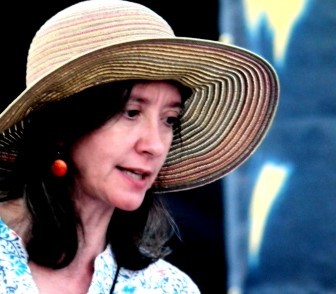 Tell the truth… I can take it… you like my hat?
Tell the truth… I can take it… you like my hat?To begin: we benefit from being aware of how we say what we say. In other words, our motivation — the reason we select our words — often determines the effectiveness of what we say.
This concept links perfectly with the second line of today’s topic, above. We’ll get there, after we have a look at telling the truth.
One of the lead stories in the Toronto Star recently updated their list of Trump’s false claims. Seems he hit 500 at day 200 of his presidency. Of course presidents lie. Trump just makes into an art-form.
Why? Well, most people lie to prop up a false ego-view of themselves. Another reason we lie is to win over others–to say what we think others want to hear. And third, some people lie because they think they have the right to.
Trump fits all three reasons, and moves the game into pathology.
But enough about the best example of lying ever in the history of the world…
August 5, 2017
Take no credit. Cast no blame. Seek to empower others. Enjoy life.
This is post 6 of 6 in the series “Universal Rules”
Synopsis: Take no credit. Cast no blame. Seek to empower others. Enjoy life. You have to do the first three to get the fourth.

Psst! Hey!
Want more great writing designed to help YOU to shift your behaviour? Check out Wayne’s books!
Free Kindle Books August 11–13!
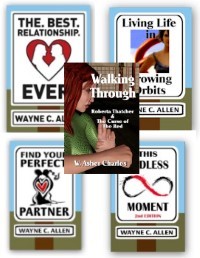
This Endless Moment 2nd. edition,
Living Life in Growing Orbits,
The. Best. Relationship. Ever.
Find Your Perfect Partner and
Walking Through
will all be free on the Amazon Kindle Store next weekend. I’ll remind you next week!
It might seem, at first glance, that the above four points are somewhat unrelated.
You might think it’s sort of a “dog’s breakfast” kind of thing — good old Wayne is shoving a bunch of stuff into a single topic. But that’s not how I see it.
At one level, the first three items lead to the last one. At another level, reminding ourselves to do the latter, while seemingly “odd,” is best done when we have stepped out of the drama that forgetting the first three creates.
So, anyway, let’s work backwards!
Here comes a new Zen story I just invented.
The student asks the Master, “How do I find enlightenment?” The Master replies, “Enjoy Life.” The student goes away, and begins to try to enjoy things.
Each night he returns to the Master and dutifully reports on the things he’d enjoyed. But the Master finds some other thing he had disliked and complained about. So the student would turn his attention to the new thing, only to be reminded of another dislike or complaint.
But no soap; the Master just points out his complaints.
So the student says, “Ah! I get it! I need to stop complaining.”
The Master kicks the student in the shin, and says, “When did you feel that kick?” The student is puzzled, and limps away.
That evening, the Master says, “How are you enjoying your search for enlightenment?” The student replies, “I think I am beginning to get it, Master. I’m sure I will enjoy the feeling of enlightenment some day, when I get there.”
At this, the Master kicks his other shin.
The Master says, “And perhaps some day soon you will feel that kick, too.”
The student, breathing deeply, rubs his shins, and is enlightened.
There is a deep paradox to the injunction “enjoy life.”
For many, “enjoyment” comes from complaining about how rotten life is treating them. Endless are the complaints, many of which revolve around the crappy application of our other three points.
Or, there is the litany, “I’ll be happy when such and such happens.” And contained within the whole thing is the dumb concept that the only way to enjoy life is to be happy. (And I’m not. Yet. But someday. Maybe.)
The student’s first error was expecting that, in order to enjoy life, one has to enjoy “things.” This is common; most people think that life itself is made up of an endless stream of things, relationships and objects.
The problem with this approach is expressed in the Plate Spinner who used to appear on The Ed Sullivan Show.
 It’s just one thing after another!
It’s just one thing after another!The “novelty” of the plate spinner’s act is how close the plates come to falling. We watch the spinner racing back and forth; somehow, through frantic effort, he manages to keep the plates aloft. But we all know that eventually there will be too many plates spinning and one will crash.
Thus it is with enjoying “things,” despite the clear instruction to enjoy life.
By focusing his attention on an object, the student became fixated on a thing. He then, with little success, tried to enjoy it. The problem is, all of the other things that were also happening became distractions or annoyances. And those things got in the way of enjoying the original thing.
His level of enjoyment of the one thing was in direct proportion to his dislike of everything else. Much like the plate spinner, he’d be enjoying something, notice his annoyance, and race to the other thing he was annoying himself over. He’d begin to enjoy (spin) that, only to notice he was ignoring or annoying himself over something else.
His first realization was:
You can’t enjoy things if you wish to enjoy life.
So, he stopped the complaining and “enjoying” game, and next focussed on how enjoyable life would be if he ever reached enlightenment.
This is the other error. Thinking that enjoying life only comes later, when some task or series of tasks is complete. The flaw is that goals have a way of always being just out of reach, and time has a way of passing us by.
We end up staying stuck while waiting for “things (there’s that word again!) to change.”
The kick to his shin, like everything that occurs, happened in the “now.” The moment of enlightenment comes when we realize that:
The only way to enjoy life is to be present in the “now.”
If I choose to see the world, see my life, as a moment-by-moment unfolding, then I can simplify the process of “enlightenment” by focusing, not on the thing(s) in front of me, but on interacting with the moment.
The truth of it is, there is only this moment, and then the next one. I have my feelings in the present. I don’t feel in the future or the past, no matter what it seems like. If I’m making myself miserable over a past event, I am doing that in this moment, so it is a current experience of a remembered past.
This is not splitting hairs.
If I choose to step into this moment, (Darbella wrote about this here (and following) — in her review of The Power of Now by Eckhart Tolle.) then all there is, is this moment, and I can choose how I relate to it.
Which brings us to our other points.
Take no credit. In most Zen tales, enlightenment comes in a flash of, wait for it, in-sight. Boom, I’m aware–both of me and of “life.” Not in a predictable way. The experience simply “is.” No one can take credit for this process.
The problem with wanting credit is that you end up living your life screaming, “See! Me, me, me! Aren’t I special! I’m the smartest! See, I told you so!” Doing so becomes “it,” or “all that there is.”
Mostly, elegant living is about simple presence and noticing the moment without trying to “shift” it. Tying yourself in knots trying to get others to notice who and where you are gets you nowhere.
Cast no blame. If I think I am a poor, helpless victim of either fate or of others, I am screwed, blued and tattooed, and I move to a place of helpless inaction.
Actually, I am where I am, dancing the dance I am dancing, by choice. I’m here because I brought myself to this dance. If I don’t like the dance, it’s not the fault of the other dancers and it’s not the fault of the orchestra. It’s not even my fault, as I know that the simple solution is to find another orchestra, find another dance.
Letting go of blaming (either others or ourselves) is a difficult choice; one that it is made moment-by-moment. But when we truly get this, we avoid the need for a kick in the shins!
Empower others. This is the “magic” of the Zen koan. The Master did not “get it” for the student. He provided an experience so that the student could get it for himself. In other words, the Master concocted an empowering experience and left the resolution to the student.
Had the kick not worked, the Master would have presented another experience. And another.
If I truly seek to help empower others, I have to let go of the outcome, and let the other person do the heavy lifting. I can provide an experience and a “field” for the other to bounce off of, but I must never think I’m going to “fix” the other person. I can’t “get it” for another person; nor can I make someone “get it.” I can’t demand that they get it.
And for sure, I can’t demand that another person “get” what I get, the way I get it. Because they aren’t me and I’m not them.
This week, look at the way you are living life. Think about the stories you tell yourself to avoid enjoying life. We don’t have to like the situations we face (no one likes death, destruction, poverty, disease) but we can certainly learn to enjoy being alive, enjoy each of our feelings, and enjoy the gift we have been given. Our days are numbered. Make them memorable.
The post Take no credit. Cast no blame. Seek to empower others. Enjoy life. appeared first on The Pathless Path.
July 29, 2017
The Finger That Points…
This is post 5 of 5 in the series “Universal Rules”
Synopsis: The Finger That Points… — Another look at our distorted view of reality

Psst! Hey!
Want more great writing designed to help YOU to shift your behaviour? Check out Wayne’s books!
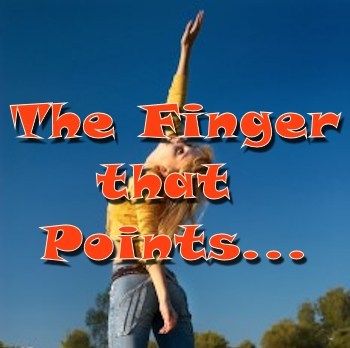 The Finger That Points to the Moon is Not the Moon
The Finger That Points to the Moon is Not the Moon Ah, those Zen masters. A couple of weeks ago I mentioned that we’d be looking at another Zen-like text, this one a slightly more obscure version of “The Map is Not the Territory.” Both concepts point to a common Phoenix Centre topic – the unreality of what we call reality.
By the bye, if you’d like a Western approach to this topic, pick up Language, Structure and Change, by Efran, Lukins and Lukins. Much of the book is a paean to the idea of the subjectivity of reality.
I remember one client (of many!!) who spent several sessions arguing with me over the absolute validity of his interpretations, despite the fact that the results he was getting, using those interpretations, were terrible.
I think of this approach as “whacking yourself in the head with your own mallet.”
I’m using the word interpretations because that’s the word traditionally used in Communication Models. (See this article for more.)
When using our Communication Model, as I express an interpretation, I usually say, (instead of “I interpret,”) “The story I am telling myself.” I like this way of phrasing things, as it reminds me that, while what I observe is somewhat fixed, what I think about what I observe (my interpretation) has everything to do with me, and nothing to do with what I observe.
Here’s another story, which helps to explain the interpretation dilemma.
Another client described what had been happening in his life. He then said (wise fellow!!!) that, since nothing he had been thinking and then trying had worked, he was willing to change anything to get “better” results.
Let me describe his issue, as it fits our discussion perfectly.
His 31-year-old daughter wasn’t living her life the way he wants her to, and they hadn’t spoken for months. He listed what she was doing that he didn’t approve of, and said that, no matter how much he insisted that she do things differently, she kept doing them wrong.
I said, “All of the things you want your daughter to do are perfectly appropriate. However, they’re appropriate for a 14-year-old. Your daughter is a 31-year-old adult.”
He got this odd look on his face for a moment, then smiled and said, “Well, that isn’t going to work.”
He had an insight into our “The finger that points…” topic.
When he saw his daughter in the flesh, he could (just) manage to see an adult. Then, he’d watch what she was doing, and go inside his head, and start making up stories.
In his mind, he saw a someone who was always in trouble, and perhaps more significant, always 14. Because of his internal stories (which have nothing to do with the daughter) he was locked into “dad of a delinquent 14-year-old mode.” And his behaviour perfectly fit that role.
Thus, his “finger pointing to the moon” was perfectly accurate within it’s own context (in his head.) It just wasn’t pointing to anything other than itself.
That’s really the point of the expression under consideration today. The saying suggests that it’s as if you raised your hand to the moon and believed that you were actually holding the moon in your hand. In other words,
we act as if the representation we make in our minds, (regarding anything,) is the actual reality of the object at “hand.”
Have you ever been in a business meetings where everyone is “trying to reach consensus?” They might have even brought in someone to “facilitate the process.” God, I love jargon.
Anyway, be honest. Weren’t you sitting there, thinking, “What the hell is the matter with these people? Why don’t the get this?”
Back in 2005 or so, I was having dinner with Ben & Jock from The Haven (this before they retired), and Jock said that they’d seen a play in NYC, and at the end, “Half of the audience missed the point.” Eyes twinkling, Ben said, “Which means they didn’t get Jock’s point.”
The reason we have so many social conventions is because we don’t see eye to eye. Politeness keeps us from killing each other — actually, from screaming or going mad. Despite (sort of) knowing this, we still waste inordinate amounts of time trying to get people to agree with our internal representations.
Every time I hear someone say, “This is how it is,” I have a pretty good idea how it isn’t. If it were that way, there would be no need to explain it or to try to convince anyone of it.
It is, then, simple arrogance that causes us to think that our opinion should be important to anyone other than ourselves.
Let me say it again: my representation of reality is nothing more than “The story I am telling myself.”
It’s like walking into a showroom with a group of friends and looking at a lamp. We all agree, at the observational, perceptional, “reality” level, that the thing with the bulb and switch and base and shade and body, sitting on a table, is a lamp.
Whether it’s a “pretty” lamp is subjective. Whether it will fill the role I have in mind for it is subjective.
A couple of decades ago I walked into my parents’ apartment. I flipped a light switch, and was “blinded by the light.” They had a chandelier with 3, 250-watt bulbs in it. I said, “My god that’s bright!” They said, “Not when you are in your 80s and have bad eyes.”
As we explore our world-views with others, the debate should not be re. “right and wrong,” because our interpersonal disagreements are simply conflicting opinions. It seems to me that the only relevant discussion is, “How is this working for me, and how is yours working for you?”
If I am treating my 31-year-old like a 14-year-old, and she doesn’t like it, and isn’t speaking to me, I can keep behaving that way in hopes that she sees the light and starts acting like a good 14-year-old. Or, I can ask myself how I like the results of my actions.
If my goal is to attempt to dominate my daughter and keep her under my control, I keep doing what I’m doing. If I want to establish an adult-to-adult relationship with her, I’m will have to, at the minimum, change my behaviour. If I am wise, I’ll also change my internal representation of her–from 14 to 31.
In the end, it’s that “simple.”
What are your internal representations? Can you own them as your personal property–not something to be “sold, or forced down another’s throat, but “yours?”
It’s about getting over trying to manipulate others into to doing it your way, while resisting manipulating yourself into doing it their way.
Then, you can examine how well all of your representations are working for you, and create ways to change the ineffective ones.
Representations are just that. The finger that points to the moon is not the moon. The map is not the territory. Simple, eh?
The post The Finger That Points… appeared first on The Pathless Path.
July 22, 2017
Change Happens Faster if You Lie to Yourself
This is post 4 of 4 in the series “Universal Rules”
Synopsis: Change Happens Faster if You Lie to Yourself — Our lives are dictated by what we tell ourselves. Making substantive alterations actually requires… lying to yourself.

Psst! Hey!
Want more great writing designed to help YOU to shift your behaviour? Check out Wayne’s books!
 Of course I can swim!!
Of course I can swim!!I used to try this line out on my clients; they found it hard to believe.
They we absolutely sure they were not lying to themselves… but they were. For example, one woman said, “I have absolutely no options.” Knowing her back story, I listed off 4 or 5 realistic options and said I could likely come up with more. She blanked out for a second, as she went inside to think about what I’d said.
When she rebooted, she said, “Well, I have no options I would actually do.”
Now, I hope you’re seeing the interesting thing that’s going on here. Strictly speaking, although we don’t put it this way, the first thing she told me was a lie.
Of course she had options! Millions of them! So, her first statement was categorically untrue.
Now, she could argue that she said the former and meant the latter; that what she meant was that she had no options she’d actually do. But no. This is emphatically not the case.
She literally and figuratively believed “I have no options.” Her belief was so strong that this lie was her truth, contrary evidence be damned.
The principal reason we stay stuck repeating dysfunctional behaviour is that the lies we tell ourselves are deeply ingrained.
If all I do is sigh and say, “I have absolutely no options,” then I have none.
If I say, “I’m stuck in a loveless marriage,” I am.
If I say, “That’s just the way I am,” I’m right.
What’s also interesting about this is that when we get into a stuck place, many are the people around who try to convince us that we indeed do have options.
But… but…the part of us that creates the stuckness (call it the ego) isn’t looking for a way out. It’s looking for confirmation.
The ego has created the belief (say, helplessness, or badness.) It is enamoured with it’s creation. It wants to keep what it has created. It actually likes the pain and hopelessness that comes from having no options.
It will therefore discount any option other than stuckness. It will do this by lying to you, and that lie will be contained in the premise that doing something different, or seeing a situation differently, is not possible.
If it wasn’t so sad, it would be amusing. The person’s entire creative output is tied up in creating excuses for not changing… wait for it… the situation or perspective they say they want to change!
Being stuck… being unable to shift one’s behaviour… is “the big lie.”
We know it’s a lie because we’ve all experienced shifting something we thought we couldn’t shift, and getting better results.
The ego is clever, though, and its principal cleverness is compartmentalization. We may have a string of successes innovating change at work, and it never occurs to us that the same skill set is available for use in our interpersonal relationships. Or, we make a shift in one relationship, yet vehemently deny the possibility of shifting another.
Until we learn to consciously lie to ourselves.
I’m playing with the word “lie,” because the idea of lying to yourself has the potential to get your attention. Another way of putting what I am saying is,
“Choosing to bring the games I’m playing with myself into consciousness.”
One of the best ways to learn how to do this is to notice “absolutizing” language. In our first example, the client said, “I have absolutely no options.” Another version is the positive absolute: “I always screw up.” In either case, (and there are tons of other absolutes,) the lie is simple. “Here I am, a poor, helpless victim of (fill in the blank) and I can do nothing about it.”
The breaking of the lie, and the replacing it with a newer and better lie comes when we notice and correct our own absolutes.
You may be wondering why I’m calling the new position “a lie” instead of going all New Agey and calling it an affirmation. One reason is that I gag on most New Age claptrap. The second reason is that the new position is a lie — until it’s adopted more or less all the time.
Let’s use “I always screw up” as an example. When I catch myself telling myself that, I stop, have a breath, and correct myself. If I was talking to myself, I correct it silently. If I said it out loud, I correct it out loud.
“I have made mistakes in the past, and I’ve also resolved a ton of similar situations. Rather than whine about this one, here’s what I’m going to do.”
You may be thinking, “Well, that’s a lot better! How can that be a lie?”
It’s a lie because you haven’t actually done anything yet. Having a plan is one thing. Implementing it 100% of the time is… something else.
The lie a kid tells himself — “I can (learn to) ride a bike!” — is how he gets on that scary two wheeler in the first place. Continuing to tell himself the lie helps him to survive falling and bleeding, repeatedly. “I can do it!” gets him back in the saddle.
But it’s a lie, until he actually can ride the bike without falling.
On the other hand, it would be stupid of the kid to act like an adult and say, “I’ll never be able to ride a bike,” and then try. Or worse, never try.
Oddly, for adults, most of our drama and silliness comes from telling ourselves what we can’t do, and then wondering why we stay stuck.
The way out is through lying to ourselves, then acting on the lie.
“I’m really shy, so I’m going to go to a party and strike up a conversation with a stranger” is a cure for shyness.
“I’m really shy, so I’ll sit in the corner and sulk” is not.
“I’ve had enough of this crazy relationship, so I’ll leave” is a curative.
“I’ve had enough of this crazy relationship, but I’m helpless to leave” is not.
And, of course, in all situations, saying “I’ll do it differently” requires actually doing it differently.
This week, watch yourself for the absolutes you’re telling yourself. Recognize them for what they are, and what they are not. They are not true — they’re convenient lies to keep yourself stuck. Change one or two, by lying to yourself and giving yourself an option or twenty. Then, act.
Because, hey… if you’re going to lie to yourself,
at least make it a good one.
The post Change Happens Faster if You Lie to Yourself appeared first on The Pathless Path.
Original article: Change Happens Faster if You Lie to Yourself.
July 15, 2017
Be Where You Are
This is post 3 of 3 in the series “Universal Rules”
Synopsis: Be Where You Are — The wise person does not know the destination. The wise person does know where he or she is now.
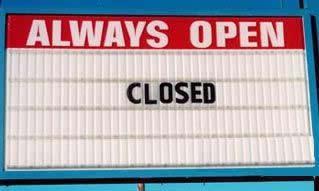 Be Where You Are — Life is a Paradox, filled with irony
Be Where You Are — Life is a Paradox, filled with ironyThere’s a bit of irony in the ideas contained above.
Forever, Buddhists have declared that the journey is not the destination–one formulation:
The finger that points to the moon is not the moon.
The major irony is that all of us know the “destination” of our walk through life — for all of us, the destination is death.
My favourite story for describing this walk (and this ultimate destination) is contained in the “Train Station” chapter of Ben Wong and Jock McKeen’s The NEW Manual for Life. The story captures the essence of this week’s “rule,” and the punch line is clearly about acting instead of thinking about acting.
So, let’s look at the two sentences above, and see what we shall see.
Back in the early 80’s, I was a member of an Artist’s Group. We exhibited our “stuff” throughout Southern Ontario. One of the guys in the group was friends with Peter Etril Snyder, an Ontario painter of (or at least he’s well-known for) Mennonite scenes.
“Uncle Pete” would attend some of our group meetings, and would repeatedly ask, “What’s your plan?”
Uncle Pete had dreamed up his plan in University, and was living it. He thought each of us should also have an “art production plan.”
Since then, I’ve met a few other artists who also have plans, one being Susan Seitz. She’s gone from plan-less to a maven of the art world. (Like that description, Susie?) She’s endlessly creative in building her vocation, or calling (see last week’s article, Find Your Calling.)
But the paradox or irony of planning is important to examine.
The paradox of planning is the one John Lennon noted back in 1980, and expressed as he sang, “Life is what happens to you while you’re busy making other plans.” Despite his whole life having come full circle–he was happily married and joyous at being a dad–“real” life happened in the form of Mark David Chapman.
I’m not trying to be morbid here, despite the death reference. The problem is with “destination thinking,” (as well as “embarkation point obsessions.”)
The problem with either approach is that your eyes are exclusively focussed on the past or the future.
I saw this especially graphically as clients wrestled with making choices. Many were so fearful of the future that they wanted an iron-clad guarantee before they would move an inch.
The second problem with a past and/or future view is that choice-ful living becomes impossible.
We make choice-ful living impossible by blaming: our upbringing, nature, genetics and “all the people out to get me.”
AND, if I am looking ahead at an imagined destination, or am rooted in place, fearfully waiting for just the right time and opportunity to act, I can also imagine that no one can “blame me” for where I am.
Focussing on endless stories about life consequences gets me off of the hook for ever having to act and for ever having to be responsible.
How to Be Where You Are
There is a real shortage of folk who have a clue about where they are now.
Most people seem to treat “here and now” as if it is irrelevant, uninteresting and “about putting in time until I get to the good stuff.”
People will say,
“Someday I’ll have a good relationship,” or
“I hadn’t noticed how stiff and locked up and sore I am until you mentioned it,” or
“I’m not choosing until I know I’m making the right choice.”
On the other hand, the people that put in the effort to stay present seem to be… well… alert. Clear. Living in the moment.
For example, in order to have a good relationship, I have to have a real sense of what I am doing, right now, to both make it stronger and screw it up. And, of course,
I can only have a good relationship
if I am present with my partner
(Let me note clearly that by “present” I mean “actively in the moment,” not simply in the same room.)
I can’t have a good relationship by thinking about it or describing it (read bitching about it) to others.
Strangely enough, the only information that is valuable, the only thing I actually can report on truthfully and thoroughly, is how I am right now.
If I wait an hour and then try to describe it, I’m going to be describing my memory of how I catalogued the experience, not the experience itself.
We all know this to be so. Think about a disagreement you had with someone you care about — a disagreement in real time, as opposed to “going off and thinking about it.” By real time, I mean that something happens and you immediately say, “This is how I see things.” And you partner does the same.
Now, often, what happens is, you discover that there are two different descriptions of something that happened right in front of the two of you.
And this is immediately after the event.
Wait an hour and your differing stories widen, as you mull things over and give the story a twist or two. And your partner is doing the same. The argument rapidly deteriorates into “who is right” as opposed to a fruitful discussion on “who I am, and how I feel, in this moment.”
The best I can ever hope for is to be aware of what I am doing in this moment, be honest enough to describe it, and to recognize that, far from “true,” what I think I see is simply my spin on life as I walk along.
My task is to bring myself into congruence with the present moment, and do my damndest to stay there. Not, as I just said, from a place of “truth” that I want others to accept, but rather from a place of knowing that “this is me, standing here, having this experience and interpreting it to myself.” Tricky.
And yet, living in this moment and the next is the only place I can live. Going into the past or into the future is an imagining process that has absolutely nothing to do with “reality” as I am presently experiencing it.
All I know is what I see and hear and feel in the present moment. Even though I may know that every time, in the past, I had reaction “a” to a similar set of circumstances, that’s just habit, not a requirement. I don’t have to repeat what doesn’t work. And I will be less likely to do so if I stay focused on the present moment.
This week, have a look at where you live. If you don’t know where you are, right now, in your life, with others, with yourself, stop and have a good look. If you’re stuck planning, and nothing is happening, maybe loosen your grip on the planning.
Right now is a good place to live. In fact, it’s the only place.
The post Be Where You Are appeared first on The Pathless Path.
Original article: Be Where You Are.
July 8, 2017
Find Your Calling
This is post 2 of 2 in the series “Universal Rules”
Synopsis: Find Your Calling — we all have one — a calling, a vocation, a purpose. Finding yourself means finding your path.
Of Wayne’s many books, the one closest to today’s topic is: This Endless Moment 2nd. edition
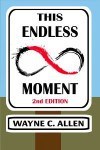 Click image for more info!
Click image for more info!The 2nd. edition of This Endless Moment is available from Amazon.
The new version has 100 plus more pages of insights and helps.
You’ll discover the resources you need for living a centered, fulfilled, and aware life.
The paperback version is here:This Endless Moment 2nd. edition
The kindle version is here:This Endless Moment 2nd. edition
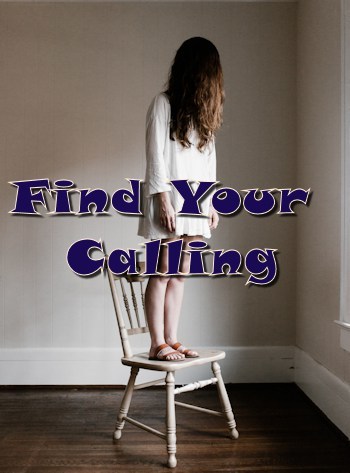 It must be here somewhere…
It must be here somewhere…Calling, vocation, and purpose are loaded words.
Vocation, especially, comes with baggage; it’s a leftover word from ancient Christianity. Nonetheless, it’s an essential word, because it reminds us that each of us is called to “be our best selves.”
This article is going to contain some cludgy language, like “best.” Being a Zen guy, I don’t think that way, and from a Zen perspective, we don’t actually have a best self to strive after.
And yet. It is also clear to me that people do indeed have skill sets. Every person has something they do exceptionally, and their lives suffer if they don’t “do what they do best.”
OK, so for this article, let’s just play with this, and use the terms vocation and calling, which I will “de-religious-ify” as we go along.
Example: The character Forrest Gump is the ultimate example of a “non-special” person having a calling, or purpose or vocation. The movie totally dispels the notion that only “special” people have callings. The opposite is the case. All people have callings — only “special” people seem to notice. Or so it seems.
And then I remember listening to Ram Dass; he spoke in Toronto back in ’82. One thing he said was that the road to enlightenment was eased by practicing ‘Nobody special training.’ In his view, we’re all special without actually being special at all.
And yet, the majority flee from the idea of vocation.
Which is too bad — the world suffers for this. So.……
Let’s get rid of vocation’s baggage
The idea that there is a difference between a vocation and a job goes back to the Middle Ages. Prior to the Enlightenment, entering the priesthood was almost the only way to get an education. Everything we consider to be a helping profession was church run and supported. (i.e. churches ran hospitals and trained doctors, and priests did the counselling — through the sacrament of confession, mostly.)
As to vocation, the thinking was that “god” called “special” people into special service, and that service meant being a member of “the religious.” Priests, monks and nuns, and church scholars were thought to have callings, or vocations. Since their gifts were presumed to be god-given, they were “better” people (and the vocation was “higher”) than the jobs held by mere mortals.
The Enlightenment created a powerful struggle against Church domination. Ultimately, “the Church’s back was broken,” both by the scientists and philosophers, and by the Reformation. With the Reformation came the idea that vocations or a callings existed outside of the Church.
What has never changed, and rightly so in my view, is the idea that a calling is a calling into service.
Therefore, one might have a calling to teach, or counsel, or to be a doctor. One might have a calling to the Arts. One might have a calling to improve the lot of humanity through innovation or through business. My mechanic definitely has a calling. He’s a mechanical artist.
A way to differentiate a calling from a job might be to ask, “What is the purpose of this venture?” If the answer is “to make money,” one might ask, “for whom?” If the answer is, “To enrich myself and the stock-holders,” one might question the “vocational” nature of such a venture. If the answer is, “To provide a service or product that others can choose to use to their benefit,” that might be a vocation.
To look at this from a slightly different angle, I remember a story my old buddy Dharmen used to tell — a story he learned from OSHO. It was about the Buddha. After he gained enlightenment, off he went, up the path to Nirvana. As he reached the top of the path, he looked back and saw all of humanity below him, struggling to understand.
He was moved to great compassion, and turned back, taking up his vocation to present to others what he had discovered.
Now, what he didn’t do was to force people to “get it.” The Buddha sat back down and started telling stories and teaching “the truth” as he knew it. His calling, then, was not “to force people to get it.” His calling was to speak his truth. What others chose to do with what he said was absolutely and only up to them.
So, how does all of this fit into calling and the majority’s resistance to it?
I think the resistance comes from the sense that if you begin to live your calling, there is no turning back. It’s no longer a job; it’s a vocation! (See? That word again.) You’re going to be doing this thing… forever.
And I think our instinct is correct: following a calling is serious business, because.….
One surrenders one’s self to the calling. I chose those words carefully.
To live your vocation, your self, your ego identity (in my case, my “Wayne-ness”) has to go far into the background. If it doesn’t, I might choose to use what I am called to do to, for example, get people to notice me. “See how special I am! Boy, have I got all of this figured out! Don’t you just love me?”
Interesting trip, this.
If I try to keep up my ego state while playing at my vocation, I’m going to burn out. Really, you have to choose, and choose, and choose again. Because nothing is permanent and nothing stays the same.
Fortunately, it’s easy to check up on ourselves, by going back to our question, “What is the purpose of this venture?” If I am honest, making is all about my “special-ness” could only have one purpose — to be seen as a guru or whatever. That’s not a vocation — it’s a sideshow.
This is where having a therapist who gets this stuff comes in handy. If you’re missing what game you’re playing, a competent therapist will be pleased to point it out to you.
July 2, 2017
If it doesn’t work, don’t do it!
This is post 1 of 1 in the series “Universal Rules”
Synopsis: If it doesn’t work, don’t do it! — Seems simple, eh? But repeating dumb behaviour is rampant. Let’s just get over ourselves!
First of all, a slightly belated 150th birthday, Canada! Darbella and I celebrated in Costa Rica with 9 friends, and ate hamburgers, poutine, and had Canada Day Cupcakes for dessert. Missed the fireworks in Waterloo, though!
Of Wayne’s many books, the one closest to today’s topic is: This Endless Moment 2nd. edition
 Click image for more info!
Click image for more info!The 2nd. edition of This Endless Moment is available from Amazon.
The new version has 100 plus more pages of insights and helps.
You’ll discover the resources you need for living a centered, fulfilled, and aware life.
The paperback version is here:This Endless Moment 2nd. edition
The kindle version is here:This Endless Moment 2nd. edition
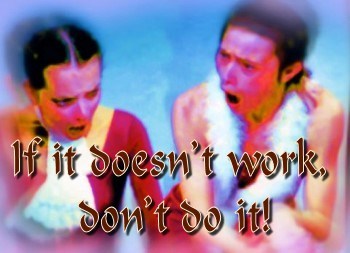
What’s This All About?
After I graduated in 1983 with my counselling Masters degree, I started sending out a paper (remember paper?) newsletter. One issue, I generated a list of 25 “Universal Rules” to live by.
I was fishing through a box, throwing stuff out, and came across the list. I read it and thought, “Hmm. Not bad. Maybe this could be the basis of some Pathless Path articles.”
I’m not committing to 25 articles, although you never know. There’s a lot of meat here, and that means having a “good look.”
One thing you’ll see in the “rules” is the most common re-occurring theme in The Pathless Path — personal responsibility. I consider this to be a no-brainer.
That said, I continually give my head a shake over how much resistance there is to this idea. Many people I know, for example, (even therapists!) drop into “If only my husband/wife was different, I could be happy” mode.
Never mind that they’ve been seeking change in others since “forever.”
Never mind that their contentment has been on hold “forever.”
Never mind that the things they say they want and need are never what they have.
They cling to the task of “getting others to see the light,” as opposed to simply focusing on their walk, their path, their understandings.
It gets quite cute, as they sigh and look sad… and then tell Dar or me (at great length) how hard they are trying, but “those other people” just won’t co-operate.
One woman we know has been battling with her husband for 13 years over “who is right.” We’ve suggested — and re-suggested — that rather than one being right, one wrong, their views are simply “different.”
We’ve suggested dialogue, good communication, but they won’t talk things out. We’ve suggested therapy, but she’s “too smart” for that. We’ve mentioned that marriages are not about fixing, but she can’t let go of dominating.
So, we’ve switched to talking alternatives. We mention that there are only three:
moan and complain,
leave the relationship, or
stay, but accept her husband as he is, while choosing to live her life as she wants to.
She thought she’d give the latter a try for a month. Then she stopped, even though things were better. Quoth she: “I can’t keep doing this! It means that my husband wins!” And around and around she goes.
The first Universal Rule — If it doesn’t work, don’t do it — addresses the “nothing (external) changes” dilemma.
Once again, this seems obvious. But hey, it’s not!
So, I like to use a business example; somehow people can “get it” when money is involved. I say,
“If you devised a policy at work, and every time you implemented it, you cost the company $50,000, how often would you do it?” And I get this quizzical, “What the hell is the matter with you??” look, and always, the same answer: “ONCE!!!”
Occasionally, if the person is a little thick, she or he will follow with, “What’s your point?”
My point is obvious. Many people treat people and situations at work with much more care and creativity than the way they operate at home.
People, as they relate to others they consider important, often lock into one mode of interaction, (some common ones: blame, the need to “fix,” martyrdom, being the “smart one,”) and that mode is best described as blatant manipulation.
I just coined a term for it:
Egoic “me-ism” — a position that implies (or states directly!) “Me and my needs should come first for you!” Because we’re not all that creative, whatever manipulative game we’re playing is the only game we’re playing, despite the fact that it doesn’t work and we’re getting crappy results.
On the other hand, doing something different is a choice that’s always available.
I once counselled a mom and dad of an 18-year-old; their son had just screwed up the first semester of his last year in High School. They’d slapped on Draconian measures to force him to do better. The son went to full rebellion mode, and they were coming to me to find harsher penalties.
I said, “Hmm. He’s 7 months away from University.” (He’d already been accepted, but wouldn’t be going if he failed his last year in High School.) “What are you and your husband going to do in September — move into his dorm room and keep trying to control him?”
They were pretty smart, and realized what they were doing… wait for it… wasn’t working. They brought him in, and we devised a strategy which was basically, “Hands off, let him sink or swim.”
Amazingly, they actually implemented this new “hands off” plan. The son breathed a sigh or relief and got to work, as he really didn’t want them moving into his dorm room.
June 24, 2017
The Most Important Step
This is post 5 of 5 in the series “Commitment in Relationships”
Synopsis: The Most Important Step — learning to be self-responsible is the only way to go!
Of Wayne’s many books, the one closest to today’s topic is: The. Best. Relationship. Ever.
 Click image for more info!
Click image for more info!The 2nd. edition of This Endless Moment is available from Amazon.
The new version has 100 plus more pages of insights and helps.
You’ll discover the resources you need for living a centered, fulfilled, and aware life.
The paperback version is here:This Endless Moment 2nd. edition
The kindle version is here:This Endless Moment 2nd. edition
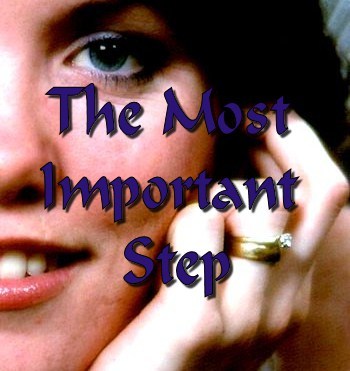
Several issues ago I proposed the following:
• I can only commit to an action — to something I will do.
• I commit to being in relationship with you. Here is what I commit to:
• I will be open, honest and vulnerable in my daily communication with you.
• I will tell you, today, who I am and what I am thinking.
• I will tell you, today, everything I have done, and what it meant to me.
• I will listen to you with curiosity and interest, today.
• I will accept that you are who you are today, and will integrate who you are today with my picture of you from “yesterday.”
• I will make myself fully available and present to and with you, today, and engage in clear and concise communication with you for not less than 30 minutes, today.
• I will own all of my thoughts, feelings, emotions and interpretations, working to take full responsibility for each and every one of them. If I slip and go into blaming, I will stop myself, apologise, and return to self-responsibility.
• I will actively encourage you to listen to me and to actively hold me to the performance of what I have committed to.
• I will commit to all of these things, without any expectation of anything from you, as all I can ever commit to is to what I can and will do.
Today’s topics:
• I will make myself fully available and present to and with you, today, and engage in clear and concise communication with you for not less than 30 minutes, today.
• I will own all of my thoughts, feelings, emotions and interpretations, working to take full responsibility for each and every one of them. If I slip and go into blaming, I will stop myself, apologise, and return to self-responsibility.
• I will actively encourage you to listen to me and to actively hold me to the performance of what I have committed to.
• I will commit to all of these things, without any expectation of anything from you, as all I can ever commit to is to what I can and will do.
I’ve decided to wrap up this series of articles. I think I’ve made my point — at least the point that is common to this group of ideas —
Everything I judge to be “so” about another is actually and totally about me
The Most Important Step is being Self-responsible
Over the years, I’ve been struck by the amount of time and effort people put into trying the get others to “behave,” or “treat them right.” Yet, over the years, I’ve never, not once, met someone who successfully changed another person.
Oh, I’ve met people who have cajoled, and bartered, and whined, and griped, and complained, and got their partner to shift something in the moment.
But lasting change? Forget it.
People treat each other the way they treat each other, and won’t change just because you want them to.
This seems like such an obvious idea.
One client I worked with was two years into her 5th dysfunctional relationship. In each of her relationships, she’d chosen a partner who thought it was his birthright to tell her what to think, how to act, how to dress, and what to do, horizontally and, emphatically, vertically.
She told me that she was in therapy to figure out why her present man refused to change his ways. Because, she told me, that’s what a “good man” ought to do.
Here was her shtick:
find a “macho” guy who turned her on,
fight with him, then have make-up sex,
after 6 months, get tired of the macho and the fighting.
tell him “If you love me, you’ll change, do it my way,” and then be baffled when he refuses.
It seemed clear to me: my client chose (almost like she was using radar) men who were into “being in charge.” There was a part of her that liked this — she said she “felt safe” when in the presence or a strong, forthright man.
After a while, though, his macho behaviour and endless criticism wore thin, and she discovered she couldn’t stand being told what to do. And remember: she did this 5 times!
So, in other words, each time, she changed her mind about what she wanted in a man. (She wanted strength and directness, then she didn’t.)
But here’s the weird part: she changed her mind, and then expected that her man should just go along with her request that he stop doing what he’s always done — the very reason she was with him in the first place.
Finding a partner and maintaining an elegant relationship is difficult. Our culture is tells us that how we feel and the way we act is determined by “good” or “bad” external forces. Therefore, relating gets mixed up into, “Getting my partner to behave in the right (read “my”) way.”
I call this partner-blaming
As I’ve tried to make obvious in this series of articles, we are what we do, not what we say. Who a person is, is wired into them. Each of us, through force of will, can modify behaviour on a moment-by-moment basis. But who we are is wired in. For more on this, read “Change isn’t possible…”
One thing this means is that you can’t change another person — you can only choose to behave differently. This means that hooking up with someone with the intention of changing them is stupid in the extreme.
Here’s another example:
A friend from back in my Seminary days married a strong-willed psychiatrist. They lasted 6 months. She told me that all they ever did was fight over who would dominate whom.
I suggested she look at her contribution to the relationship failure. She (predictably) blamed the guy. In a slight twist, she said, “What I’ve figured out is that I need a guy who does what I tell him to. We’ll never fight, and things will be great!”
Yeah, right.
A year later, she married a guy I called “Lester Milquetoast.” The guy was mild-mannered in the extreme, always agreed with everything she said, did what she said, etc. (The first time I met him he spent half the meal cutting her meat!)
Two years later she dumped him. Showed up on my doorstep, and declared, “He never has an opinion! He makes me make all the decisions!!”
Yeah, right. It’s entirely his fault… Not.
How I choose to relate is totally about what I will do, whether in relationship or as I engage with the world. So, if things seem to be “slipping,” my responsibility is to state what I observe, and then state what I will do to get things back on track.
Both my client and my Seminary friend “ordered up” the men they got. Then, each grew tired of what she’d ordered, and demanded that the man change.
Had I said to either of them: “You need to change and become acquiescent, doing exactly what your man tells you to do,” each would have refused: “Why should I have to do what he says?”
This is the danger of expecting others and the world to have nothing better to do than to make you happy.
At the end of the day, happiness, like everything else, is an inside job.
Our last series of points are simple and self-responsible. Rather than hold my partner accountable to my whims and desires, I turn it around and hold myself accountable, and then give my partner permission to also hold me accountable.
It’s saying: “Here is how I agree to be and act in our relationship. I will slip from time to time. I intend to catch myself when I slip. If I don’t, please remind me.”
Now, of course, this will work elegantly only if my partner has made exactly the same agreement with me, and sticks to it.
I would argue, though, that in less than ideal relationships, one person can choose to be accountable to his or her partner, without the requisite agreement from the partner, and that the person who chooses accountability will be much, much better off than he or she was when all that was happening was blaming.
On the whole, though, I believe that it’s better to leave a relationship that is not equal than to live with the imbalance. That’s more a personal preference than a hard and fast rule.
So, that’s where I am on this topic. I suggest that you resolve to live with honesty, integrity, and commitment. Do it for yourself — for your spiritual and bodily well-being. Pick a direction, own it, commit to it, stick to it.
The post The Most Important Step appeared first on The Pathless Path.
Original article: The Most Important Step.
June 17, 2017
Curiosity, Interest and Acceptance
This is post 4 of 4 in the series “Commitment in Relationships”
Synopsis: Curiosity, Interest and Acceptance — the three things that keep a relationship fro going off the rails. And notice: no mention of controlling the other person!
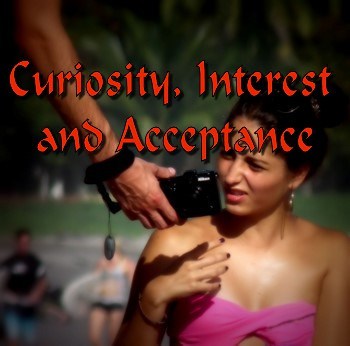
Several issues ago I and proposed the following:
• I can only commit to an action — to something I will do.
• I commit to being in relationship with you. Here is what I commit to:
• I will be open, honest and vulnerable in my daily communication with you.
• I will tell you, today, who I am and what I am thinking.
• I will tell you, today, everything I have done, and what it meant to me.
• I will listen to you with curiosity and interest, today.
• I will accept that you are who you are today, and will integrate who you are today with my picture of you from “yesterday.”
• I will make myself fully available and present to and with you, today, and engage in clear and concise communication with you for not less than 30 minutes, today.
• I will own all of my thoughts, feelings, emotions and interpretations, working to take full responsibility for each and every one of them. If I slip and go into blaming, I will stop myself, apologise, and return to self-responsibility.
• I will actively encourage you to listen to me and to actively hold me to the performance of what I have committed to.
• I will commit to all of these things, without any expectation of anything from you, as all I can ever commit to is to what I can and will do.
Today, we’ll look at:
• I will listen to you with curiosity and interest, today.
• I will accept that you are who you are today, and will integrate who you are today with my picture of you from “yesterday.”
Curiosity, Interest and Acceptance — Sounds like an accounting firm, eh?
June 10, 2017
Honesty in Communication
This is post 3 of 3 in the series “Commitment in Relationships”
Honesty in Communication — this is definitely a self-help project, as all you can do, even in relationship, is work on yourself.
Of Wayne’s many books, the one closest to today’s topic is: The. Best. Relationship. Ever.
Here’s the list we’re working on:
• I can only commit to an action — to something I will do.
• I commit to being in relationship with you. Here is what I commit to:
• I will be open, honest and vulnerable in my daily communication with you.
• I will tell you, today, who I am and what I am thinking.
• I will tell you, today, everything I have done, and what it meant to me.
• I will listen to you with curiosity and interest, today.
• I will accept that you are who you are today, and will integrate who you are today with my picture of you from “yesterday.”
• I will make myself fully available and present to and with you, today, and engage in clear and concise communication with you for not less than 30 minutes, today.
• I will own all of my thoughts, feelings, emotions and interpretations, working to take full responsibility for each and every one of them. If I slip and go into blaming, I will stop myself, apologise, and return to self-responsibility.
• I will actively encourage you to listen to me and to actively hold me to the performance of what I have committed to.
• I will commit to all of these things, without any expectation of anything from you, as all I can ever commit to is to what I can and will do.
Today we’ll look at the following three points from the above list:
· I will be open, honest and vulnerable in my daily communication with you.
· I will tell you, today, who I am and what I am thinking.
· I will tell you, today, everything I have done, and what it meant to me.
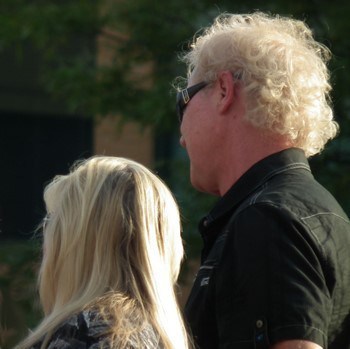 An honest discussion, a heartfelt sense of “being with.”
An honest discussion, a heartfelt sense of “being with.”The only way to build and maintain an excellent relationship is through the rigorous implementation of useful actions. To repeat the obvious, the key to successful anything is action as opposed to talk.
This week’s three points are absolute, as opposed to conditional.
In the past I’ve mentioned how much Darbella and I have learned from our study of OSHO, the Indian guru “formerly know as Bhagwan Rajneesh.” (OSHO Store — check out this link for more OSHO books)
In his book Intimacy, OSHO makes the case for self revelation:
“Unless you drop all your repressions and inhibitions—which are the gifts of your religions, your cultures, your societies, your parents, your education—you will never be able to be intimate with someone. You will have to take the initiative.” pg viii
“You have to accept yourself in your totality. If you cannot accept yourself in your totality, how can you expect somebody else to accept you? ” pg viii
OSHO said that it is “normal” for someone to hate an aspect (or several) of themselves, and then expect their partner to “accept them as they are,” or “fix them.” This is weird — such people believe that love is all about the other person behaving as they want them to.
OSHO wondered why anyone would accept you, if you don’t accept you.
One answer to this question is that one’s partner also hates him or herself, so there’s a meeting of two dysfunctional people; this is the meaning of the adage, “Misery loves company.” Because many marry or get together out of a need to be unconditionally accepted, each person expects the other person to “make it all better.” This is a sure recipe for disaster.
Before we dig in, let me also note that, in the latter two points for the day, I have included the word “today.” It’s there for a reason.
Often, people in love say the strangest things, like “I’ll love you forever! I’ll always be there for you! I love everything about you.” This is the height of dumb, as all we ever have is… you guessed it… today.
Love makes us stupid, and so does day-to-day living. Given our greatest fears — death and change — we seem almost compelled to hold on to what is happening by claiming it will go on forever. Then, when forever ends, (as it always does) the accusations of “You lied to me!” come to the fore.
Lets get back to our points
Today’s three points are all the same. Each requires the speaker to be open, honest, and revealing. There can be no hidden material, no hidden agendas. This requires great discipline.
OSHO wrote about the origins of our resistance to self-revelation. It’s pretty simple. We hate whole aspects of our selves. We feel our emotions directly, yet fear their expression. We create movies in our heads, and thank god no one else can see the things we say and do in there. We are sure that if our partner ever knew what went on inside of us, they’d run for the door.
And we assume that we are the only one like this. We pray that no one catches us out, and hope that, if we slip, our partner will cut us slack.
Then, our partner lets one of their cats out of the bag, and we pounce. “You lied to me! You disappointed me! You’ve been lying to me!” We conveniently forget all of the crap we’ve been stuffing, and turn the whole thing inside out, judging “the other” our partner has become.
Forever, we have been suggesting the alternative — self-responsible self-revelation. The suggestions above are the beginning of true intimacy.
It’s a simple as, “If I have nothing to hide, there is nothing hidden.”
If you want to read about the nitty gritty for communication, I’ve written a ton of articles. Just CLICK HERE for a list.
Now, admittedly, this flies in the face of every bit of cultural conditioning we’ve received.
We’ve been trained to blame and minimise — to give the “proper excuses.” “I am so angry, and it’s his fault.” Or, “I am really sad, and you would be too if all of this had happened to you.” Or, “Here are all the reasons I can’t stop criticizing.”
Therapy and Bodywork are two experiences that lend themselves to the practice of being open, honest and vulnerable — it’s kind of the point. Excuses for a feeling are not required. In fact any therapist worth their salt will tell you to park the reasons and get to the feelings, as the reasons are just stories you’ve made up after the fact to justify what you are feeling.
I’d love to tell you that most of the people I saw for therapy were fully open in their self-disclosure, but that would be untrue. The conditioning to lie to oneself and to others runs deep. The excuses and explanations are often all the person knows. That is the point of therapy — to get past the superficial part to what’s really going on.
Trust, interestingly, is not created by being in a relationship. Trust is a personal trait or perspective.
What I mean is that I do not create the conditions for the person I’m with to feel safe enough to speak. If this were the case, others could only speak their truth when the people around them were behaving perfectly.
No, as OSHO says, this project is totally about one’s willingness to open up and say what’s going on, because that’s the only way to get anywhere. In this process of saying, of revealing, one learns to respect and forgive and (horrors!) even like oneself.
Revelation and acceptance is an inside job.
Be aware, this week, of how many times you keep yourself from being fully open and revealing with your therapist, your partner, yourself. Listen and see if you’re presenting excuses and justifications as opposed to open, honest, vulnerable communication. Then, see what happens as you begin to self-disclose.
And remember, you may just discover that some of the people you’ve had around you for a while really don’t want to know you, don’t want honesty, because they are afraid of letting their stuff out. Better to know this and either go for therapy or find a new partner. (Or both.)
Life is short, and taking your time with this work is plainly dumb. Make a commitment to be honest with yourself, open and vulnerable and honest with others. And commit to moving away from relationships where openness, honesty, and vulnerability is not encouraged.
You do not have forever. So, start.
The post Honesty in Communication appeared first on The Pathless Path.
Original article: Honesty in Communication.



